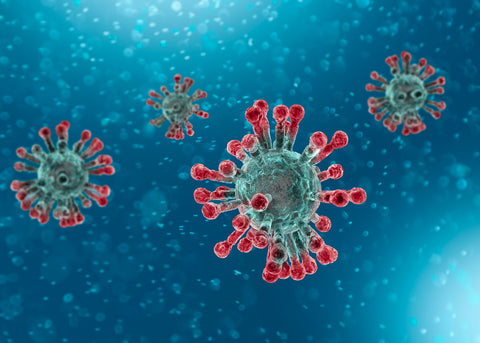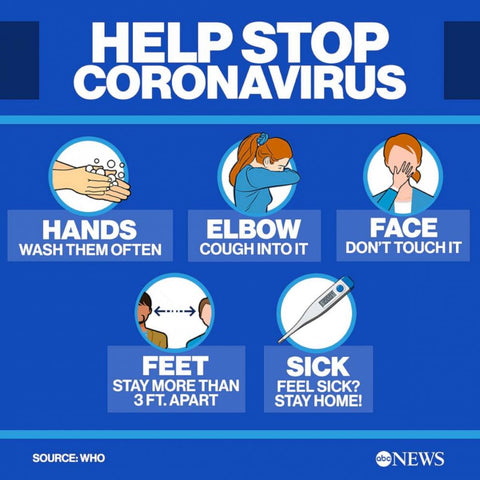
Pregnancy is a wonderful time full of anticipation and excitement. No need to say that it can also be full of stress and anxiety to the same degree. Those expectant mothers who are facing the arising of the coronavirus disease (COVID-19) are twice worried about the health of their babies. What is COVID-19, do the symptoms differ in pregnant women and the general public, which special measures to undertake in case a pregnant woman got infected by COVID-19 are the questions we are going to discuss today.
What Is COVID-19?

COVID-19 (one of seven types of coronavirus) has become a new frightening illness of the third millennium. The World Health Organization states that most people infected with the COVID-19 virus may experience mild to moderate respiratory illness. Interesting that young people may even recover without special treatment while older people are more likely to get seriously ill. Many are afraid of COVID-19 as it can easily affect the lungs and breathing. The most typical symptoms of COVID-19 include:
- fever
- cough
- sore throat
- trouble breathing
- headache
- shaking with chills
- muscle pain
- nausea
- diarrhea
- loss of sense of smell or taste.
If the person was infected by a coronavirus, the symptoms will not necessarily become apparent as disease progresses. The problem is that symptoms may appear 2 to 14 days after the person is exposed to COVIS-19.
How may coronavirus affect pregnant women and fetuses?
Research into COVID-19 is ongoing, however, current reports show that there is no difference between the symptoms the pregnant women and other people reveal. Because of changes in their bodies and immune systems, pregnant women need special care. However, this applies to every pregnant woman, especially, in the last months of pregnancy. They can be affected by COVID-19 only if no measures are taken. Doctors ask pregnant women to take the same steps as other groups of people to avoid COVID-19 infection. In case, pregnant women are feeling anxious about giving birth in the circumstances of COVID-19 pandemic, doctors recommend learning how to control the feeling of anxiety.
Should I continue to visit my doctor for check-ups?
Some expectant mothers prefer staying home instead of going to appointments. The solution here is to get adapted to the current situation but take necessary measures if necessary. In order to follow practicing physical distancing, medications can be prescribed by phone, the actual appointments can be shortened. Giving the fact that healthcare professionals are at high risk of getting infected by COVID-19, it is not recommended for expectant mothers to visit a hospital or clinic. However, a healthcare professional is obliged to tailor the modifications for individual patients depending on their health condition.
If I get infected by coronavirus, will it be passed to my unborn baby and which way?

It still is not clear whether the virus can be transmitted from a mother to a baby during pregnancy or not. This is called vertical transmission, and it is very unusual for common respiratory viral illnesses in pregnancy. Many expectant mothers are wondering if they can pass the virus after pregnancy through breastmilk. As of now, the research shows that coronavirus can be only be passed by air which means that it cannot get into breastmilk, vaginal, amniotic fluid, in blood or the placenta any possible way.
Can COVID-19 cause preterm birth, miscarriage or anomalies?
Dr. Kjersti Aagaard, professor of obstetrics and gynecology at Baylor College of Medicine says that “data from the SARS epidemic in 2003 and the MERS epidemic in 2012-2013 reassure that there is no increased risk of fetal loss or congenital anomalies”. The same applies to adverse neonatal outcomes such as low birth weight or preterm birth. It is too early for researchers to know if the preterm births, fetal losses and congenital anomalies occurring during the COVID-19 pandemic were caused exactly by this virus.
Should I give birth in a hospital or at home?
Unfortunately, the answer to this reasonable question cannot be straightforward. A woman should ask her midwife or healthcare professional which option would be more suitable. It depends a lot on woman’s situation and the healthcare system of a specific country. While most women are afraid to give birth at home, in some countries like the Netherlands this practice is quite common. Before labor begins, it is important to check if the hospital has separate facilities for those expectant mothers with the COVID-19 virus and those without. Also, expecting mothers should know their midwife or doctor to call when the labor begins.
What should I do to avoid the COVID-19 and keep myself safe during pregnancy?
During the COVID-19 virus outbreak, all people are at risk of contracting the virus. Pregnant women should not be treated as some dangerous group of people. If you are an expectant mother, you need to take the same steps as other people to protect yourself from infection. They include:
- Avoid close contact with anyone displaying symptoms or being infected by COVID-19 disease
- Wash your hands often with soap and water for at least 20 seconds after being in public places, using transport, coughing, sneezing or blowing your nose
- Clean your hands with a hand sanitizer that contains at least 60% alcohol. A hand sanitizer can be used instead of water and soap to wash your hands or clean the surfaces where coronavirus may settle
- Avoid touching your eyes, nose, and mouth with unwashed hands
- Stay home as much as possible
- Stay at least 3 feet away from other people
- Avoid using public transport and gatherings in public places.

If a pregnant woman is feeling worried about her child to be infected, she has to try to relax, breathe deeply and call her midwife if needed. Also, eating well, drinking well, putting hands on her belly may help to ease the feeling of anxiety.
To conclude
For pregnant women, it can be really hard to carry a baby, especially, during such an unpredictable pandemic as COVID-19. So far, research shows that pregnant women are not at more risk than other people. They have no reason to be worried about their babies to be born infected as a virus can be only transmitted through air. If they do the same things to protect themselves as everyone else, they may feel safe. If you would like to know more about healthy pregnancy, how to determine a gender of your baby and many more, feel free to visit our blog and learn more about our Gender Prediction Theories.

